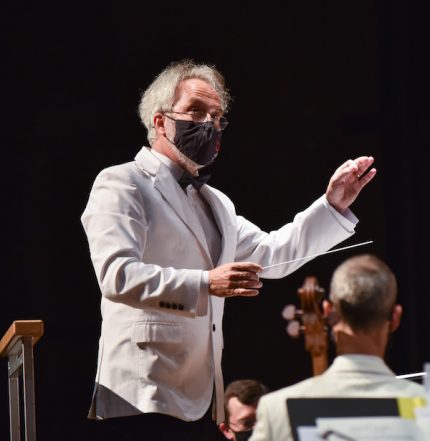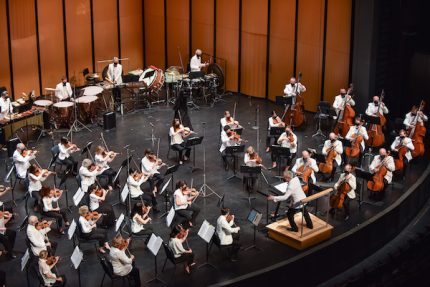Kalmar, Grant Park Orchestra members shine brightly in festival premieres

The final concerts of July at the Grant Park Music Festival are always an indoor affair with Carlos Kalmar and the Grant Park Orchestra escaping Lollapalooza and repairing to the underground sanctuary of the Harris Theater. With Chicago’s on-again, off-again, on-again Covid protocols, Kalmar and all non-wind players remained masked at Friday night’s concert. Though the event was live-streamed and not open to the public, a sizable “private” audience was audibly on hand as indicated by the vigorous applause and ovations.
Both conductor and orchestra are clearly in peak summer form as shown in this venturesome program, which included two festival premieres from the 20th and 21st centuries.
This was the Grant Park Music Festival’s debut live-streamed event. Apart from a couple vertigo-inducing camera whips early on, the stream was technically exemplary both visually and sonically, with nearly all of the evening’s key orchestra solos captured in the moment.
Music of Franz Joseph Haydn opened the evening.
Of his job as court composer at the Esterhazy Palace, Haydn famously wrote, “I was in the middle of nowhere, cut off from all musical influences, and I was forced to become original.”
His Symphony No. 8 certainly shows that musical ingenuity. The third of Haydn’s consecutive “Morning, Noon and Night” symphonies (Nos. 6-8), “Le Soir” shows the composer’s quirky distinctive style already evident, with several breakout solos for the front-desk players. The Eighth Symphony stems from early in Haydn’s Esterhazy tenure, and he clearly became popular with both his employer and the musicians, staying in the palace for over three decades.
Kalmar and the players brought out the wit and light humor of this music delightfully. The conductor’s pacing of the first movement was just right, not overdriven, and the main theme went with the buoyant playfulness of a children’s song, spiced by delicious flute descants by Mary Stolper.
In the middle movements, the first chair players brought polish to their moments in the sun, particularly Jeremy Black who dispatched his violin solos with piquant charm. The finale, “La tempesta” is one of Haydn’s earliest bits of musical onomatopoeia, and Kalmar and the orchestra handled this not-too-dangerous storm with high-spirited finesse, enhanced by more fine solo work from Stolper and Black.
The conductor’s impeccable balancing—the harpsichord always audible but never spotlit— was well caught by the excellent quality of the stream. More Haydn please from Kalmar and company.
It was an artful bit of programming to follow Haydn’s symphony with Caroline Shaw’s Entr’acte. This 11-minute work for strings (originally for string quartet) was inspired by the American composer hearing a performance of Haydn’s String Quartet in F major, Op. 77, no. 2.
Shaw takes a minuet-ish theme and inverts Haydn’s traditional approach. Instead of cheerful, her motif is tense and edgy, almost immediately becoming unmoored harmonically. What follows from Shaw is an imaginative controlled demolition—she subjects the theme to various treatments, following with pizzicatos, quasi-Baroque bariolage and a spare violin solo—again played with rapt sensitivity by Black. This segues into a seesawing climax, high violins against multiple scattered shrugs from strings and an emphatic reprise of the opening. As violins slowly winnow high and away, a hushed pizzicato cello solo closes the work, rendered with remarkable dynamic subtlety by Walter Haman.
Shaw is a composer we should hear more of locally and Entr’acte is among her most impressive efforts. Kalmar led a highly focused, wholly sympathetic performance of this challenging work.
The evening closed with Carmen—well, kind of sort of.
The Russian composer Rodion Shchedrin was highly prolific yet his enduring fame rests almost entirely on his Carmen Suite. Written for the composer’s wife—the Bolshoi’s prima ballerina Maya Plisetskaya—this 1967 ballet distills Bizet’s lengthy opera down to a single act of 44 minutes. All of Bizet’s beloved melodies are here but retooled from a mid-20th century Russian perspective.
It is the unique scoring for strings (no winds or brass) and four percussionists that makes this a masterpiece of transcription. Shchedrin’s revamped Carmen (which cribs from other Bizet works as well) emerges as ironical, occasionally subversive, but ultimately affectionate. His clever, imaginative retooling avoids bombast and makes one hear Bizet’s familiar melodies with fresh ears and renewed admiration.

The string players and percussionists were in top form for this score, cast in 13 brief sections. From the opening Habanera pre-echo—heard on hushed chimes against lower strings—Kalmar led the musicians in a rousing performance that delivered every musical rim shot and played every whoosh, sweep and rattle for all they were worth.
Highlights included the sinuously stringy Habanera, with some antic balcony commentary by chattering maracas and a yearning Second Intermezzo (minus the flute solo). There is also a sumptuous, silver-screen redo of Don Jose’s Flower Aria and a bit of sleight of hand with the jokey take on the Toreador Song. (Shchedrin pulls the rug out by initially only presenting the accompaniment to Escamillo’s aria rather than the swaggering melody itself.)
Kalmer directed the performance with subtlety as much as vitality, bringing as much focus and scrupulous balancing as he would to a Mahler symphony. The Grant Park Orchestra members were at their finest with special kudos reserved for the four hard-working percussionists who manned a beastiary of instruments: Joel Cohen, Doug Waddell, Eric Millstein and Richard Janicki.
Friday night’s stream remains available for free viewing on the festival website. Christopher Bell leads the Grant Park Chorus in “From Ireland with Love” 6:30 p.m. Wednesday at the Pritzker Pavilion. gpmf.org
Posted in Uncategorized

